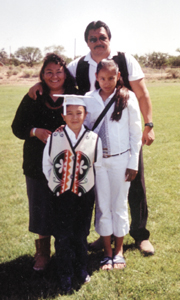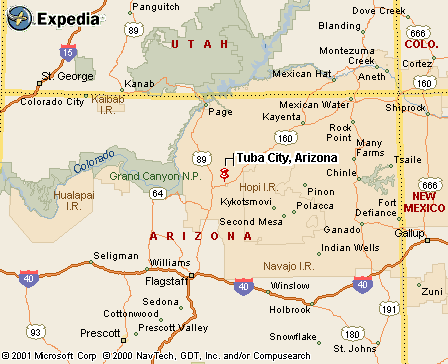|
|
Canku Ota |
|
|
(Many Paths) |
||
|
An Online Newsletter Celebrating Native America |
||
|
May 22, 2004 - Issue 113 |
||
|
|
||
|
Taking on Tribal Campus Issues |
||
|
by Ann Widmann - Navajo-
Hopi Observer Editor
|
||
|
credits: photo:
Violet Tso and family - courtesy Navajo-Hopi Observer
|
|
TUBA CITY — Diné College student Violet Tso attended her first American Indian Higher Education Consortium conference in Billings, Mont., this spring and returned to Tuba City as the group's Student Congress President.
At the conference, Tso said she entered several competitions including speech. Her persuasive speech arguing against Peabody Coals's continued use of the N-aquifer netted her a third prize. Her informative speech covered traditional Navajo pottery, and she garnered both an honorable mention and an award of excellence for the artwork she entered. Tso proudly pointed out that her mother, Faye Tso, has the designation of being an Arizona Living Treasure because of her pottery. "During the competitions, I found out about the Student Congress elections, suggested that Diné College get involved and found out how to get into the race," she said. "There were four us running for president, two males and two females." On March 24, the day of the election, Tso's campaign speech focused on lobbying to get tribal campuses fully developed. "Federal agreements whether treaties or federal acts always mention good quality education," she said. "The treaty with the Diné nation was over a hundred years ago." But she pointed out on just about on any branch campus, facilities are lacking, consisting of doublewides or even condemned buildings. Tutoring programs, financial aid, computer equipment, books, libraries, science labs and fine arts facilities are other areas Tso highlighted as needing improvement. "With my personal experience coming from a branch campus, I really connected with students from other tribal branch campuses," she said. "Almost every cent goes to the main campuses; branches are forgotten or given just a few crumbs to get by." Tso said the election ended in a tie between herself and the other female candidate. "We both were asked to come back to the stage for another three-minute speech," she said. With one representative from each tribal campus voting to break the tie, Tso came out on top. Her term of office runs through March 2005. Tuba
City campus Harold Joseph, Director of the Tuba City Campus of Diné College, said Tso presented a resolution for support from each chapter delegate within the Western Agency for a $25 million campus development project. Joseph pointed out the campus now only has two buildings, a hogan donated by the American Indian College Fund and an eight-classroom building resulting from Arizona Compact legislation and funded by sales tax revenues. Tso said she plans to bring tribal colleges closer together to work on issues at the national level and is starting to gather data on what each is pursuing. She is also collecting positive and negative feedback via e-mail on this year's AIHEC annual conference. Diné College and seven other tribal colleges will co-sponsor the March 2005 conference in Albuquerque, N.M. Community
voice "This has been a breathtaking experience for me," Joseph said. "I first got to know Violet a year ago at our college symposium where she volunteered to be a host. Since then she has become very active—a voice for our community and our students." When students at Diné College formed their own local Tuba City student government last fall, they elected Tso as their first president. Joseph went on to point out that Tso is a role model. "She's has a family, she's a wife, a student and her mother's caretaker," he said. "We are all proud of her here in Tuba City. With this title she will have the opportunity to work with other tribal colleges. We plan to do everything we can to support her." Initially, Joseph said he's looking for office space for Tso on campus as well as funding sources for her travel. A summer AIHEC retreat is planned as well as at least two AIHEC related trips to Washington, D.C. in the next year. Tso will graduate this spring with a double major in liberal arts and social sciences. She plans to get her bachelor's degree in elementary education, then a master's in English. She has attended Diné College on scholarships from the American Indian College Fund and a Navajo Nation Tribal Scholarship as well as a federal Pell Grant. Inspiration "Just before he passed away four years ago, he talked to me about living in a society controlled by mainstream Western Europeans and needing to be able to read, write and speak at their level in order to protect our own people, language and culture," Tso said. "That became my biggest motivation for going back to school and it's why getting a master's in English is so important to me. "As a child, I struggled with two main subjects, math and English. After talking to my dad, I'm no longer looking at it [the struggle] as an obstacle but a challenge to master." Tso thanked staff and instructors for the support she has received throughout Diné College Tuba City campus. She also thanked her husband, Darwin, her daughter, Chantel, and her son, Dejay, for "really coming through for me and taking over responsibilities for me when I leave." "I feel like I've brought something home to our students to help motivate them, encourage them to keep going and strive for their dreams," Tso said. "I'm trying to stay grounded with all this. I don't want it to get overwhelming and cause me to lose focus on the issues. By taking it one step at a time, it will get done." |
|
|
www.expedia.com |
|
|
||
|
|
||
| Canku Ota is a free Newsletter celebrating Native America, its traditions and accomplishments . We do not provide subscriber or visitor names to anyone. Some articles presented in Canku Ota may contain copyright material. We have received appropriate permissions for republishing any articles. Material appearing here is distributed without profit or monetary gain to those who have expressed an interest. This is in accordance with Title 17 U.S.C. Section 107. | ||
|
Canku Ota is a copyright © 2000, 2001, 2002, 2003, 2004 of Vicki Lockard and Paul Barry. |
||
 |
 |
|
|
The "Canku Ota - A Newsletter Celebrating Native America" web site and its design is the |
||
|
Copyright © 1999, 2000, 2001, 2002, 2003, 2004 of Paul C. Barry. |
||
|
All Rights Reserved. |
||
 AIHEC
includes 35 tribal colleges, 34 across the United States and one
in Canada. Diné College sends a team of students to the organization's
annual conference to compete in events such as the Knowledge Bowl
and Science Bowl. Generally, the competitors hail from the main
campus in Tsaile. Tso said she was invited to be part of this year's
team after being named Diné College Student of the Year—recognition
based on an essay, questionnaire, biography, grades and a resume
of school/community activities. "This is the first year a student
was involved from one of Diné College's branch campuses,"
Tso said.
AIHEC
includes 35 tribal colleges, 34 across the United States and one
in Canada. Diné College sends a team of students to the organization's
annual conference to compete in events such as the Knowledge Bowl
and Science Bowl. Generally, the competitors hail from the main
campus in Tsaile. Tso said she was invited to be part of this year's
team after being named Diné College Student of the Year—recognition
based on an essay, questionnaire, biography, grades and a resume
of school/community activities. "This is the first year a student
was involved from one of Diné College's branch campuses,"
Tso said.